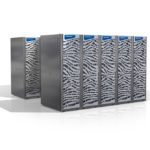It’s been a good week for Arm: the Fugaku supercomputer at Japan’s Riken research center was named no. 1 on the TOP500 listing of the world’s most powerful HPC systems, and today, the Leibniz Supercomputing Centre (LRZ) in Munich announced it will deploy HPE’s Cray CS500 with Fujitsu A64FX chips based on the Arm architecture – the same processor used in Fugaku (and then there’s Apple switching from x86 for new Arm chips).
Video: Cray Steps up with 2nd Generation AMD EPYC Processors for HPC
In this video, from Forrest Norrod from AMD welcomes Peter Ungaro from Cray to discuss how 2nd Generation AMD EPYC processors with drive new levels of performance for HPC. The AMD EPYC 7002 Series Processors are the first x86 server processors featuring 7nm hybrid-multi-die design and PCIe Gen4. With up to 64 high performance cores per SOC, 2nd Gen AMD EPYC Processors deliver world-record performance on industry benchmarks. They are available in the Cray CS500 cluster and Shasta supercomputers.”
AMD to Power Two Cray CS500 Systems at Army Research Centers
Today Cray announced that the U.S. Department of Defense (DOD) has selected two Cray CS500 systems for its High Performance Computing Modernization Program (HPCMP) annual technology procurement known as TI-18. The Army Research Lab (ARL) and the U.S. Army Engineering and Research Development Center (ERDC) will each deploy a Cray CS500 to help serve the U.S. through accelerated research in science and technology. The two contracts are valued at more than $46M and the CS500 systems are expected to be delivered to ARL and ERDC in the fourth quarter of 2019.
Podcast: Tackling Massive Scientific Challenges with AI/HPC Convergence
In this Chip Chat podcast, Brandon Draeger from Cray describes the unique needs of HPC customers and how new Intel technologies in Cray systems are helping to deliver improved performance and scalability. “More and more, we are seeing the convergence of AI and HPC – users investigating how they can use AI to complement what they are already doing with their HPC workloads. This includes using machine and deep learning to analyze results from a simulation, or using AI techniques to steer where to take a simulation on the fly.”
Cray Powers Haas Formula 1 Team
For the third year in a row, the American Haas F1 Team will use the computational capacity of a Cray Cray CS500 cluster supercomputer powered by AMD EPYC 7000 processors to handle its large CFD simulations for the 2019 season. “The double precision computing power of our new system will help solve our most demanding CFD and data challenges.”
Cray Adopts AMD EPYC Processors for Supercomputing
Cray is the first system vendor to offer an optimized programing environment for AMD EYPC processors, which is a distinct advantage. “Cray’s decision to offer the AMD EPYC processors in the Cray CS500 product line expands its market opportunities by offering buyers an important new choice,” said Steve Conway, senior vice president of research at Hyperion Research.
Cray to build FPGA-Accelerated Supercomputer for Paderborn University
Today Paderborn University in Germany announced that it has selected a Cray CS500 cluster system as its next-generation supercomputer. This procurement is the first phase of the Noctua project in which a multi-petaflop-system with a total budget of 10M euros. The initial HPC system provides academic researchers from Paderborn University and nationwide with computing resources primarily for computational material science, optoelectronics and photonics, and computer system research. The system is expected to go into production in 2018.
KISTI in South Korea orders up a Cray CS500 Supercomputer
Today Cray announced the Korea Institute of Science and Technology Information (KISTI) has awarded the Company a contract valued at more than $48 million for a Cray CS500 cluster supercomputer. The 128-rack system, which includes Intel Xeon Scalable processors and Intel Xeon Phi processors, will be the largest supercomputer in South Korea and will provide supercomputing services for universities, research institutes, and industries. “Our supercomputing division is focused on maximizing research performance while significantly reducing research duration and costs by building a top-notch supercomputing infrastructure,” said Pillwoo Lee, General Director, KISTI. “Cray’s proficiency in designing large and complex high-performance computing systems ensures our researchers can now apply highly-advanced HPC cluster technologies towards resolving scientific problems using the power of Cray supercomputers.”










